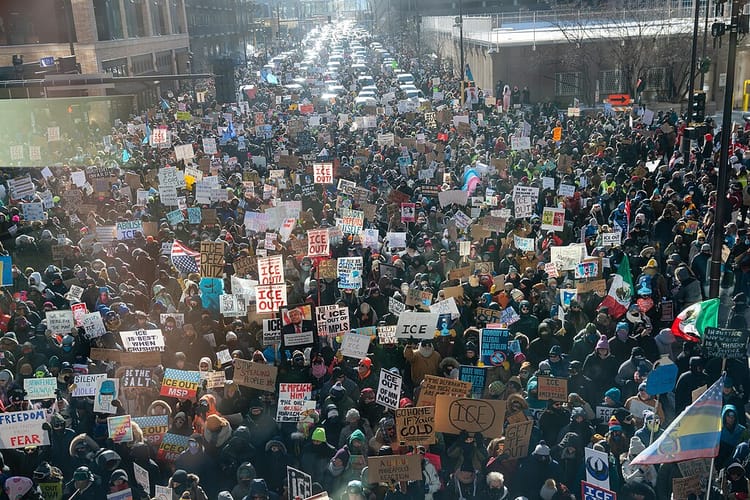On Climate Week and Toxic Positivity

Last week was New York Climate Week, which happens alongside the UN General Assembly every year, or as I overheard one person describe it: the UNGA games. I've never participated in Climate Week, but those who are regulars told me it seemed even busier and griftier than usual this year. Some thought that was a function of the high stakes U.S. election, others figured it was because so many people are skipping the annual UN Conference of the Parties, or COP, this year in Azerbaijan. In any case, yes there were the expected corporate greenwashing showcases, but even the more legit climate events left me with the same feeling I've been having at most climate conferences in the past year or two, an unsettling disconnect between people noshing on passed hors d'oeuvres and sipping craft cocktails while talking about the need to "stay positive!" "tell the positive stories!" "give people hope!" and the reality crashing in all around us, which this week included Hurricane Helene, a deadly storm and landslides in Nepal, a climate activist being sentenced to 2 years in prison in the UK for throwing soup on a painting, and, as always, more news of expanding fossil fuel development.
Don't get me wrong, there are good news stories and I know how important it is to share and savor them, but the focus on positivity to the exclusion of anything else felt completely surreal and, if I'm being honest, a little scary. It reminded me of something I've heard climate psychologist Renee Lertzman say repeatedly over the years, that the climate crisis is a trauma that needs to be processed, and of what trauma specialist Thomas Hübl calls "collective numbness," that thing that happens when people tacitly agree to leave the trauma lingering, unprocessed, below the surface. I'm not trying to tone police or dictate any one particular emotional reaction to the climate crisis—I've had three very different reactions myself just today! Everyone deals with the communal anguish of watching the world be destroyed in slow motion differently, but seeing so many climate leaders demand positivity, and only positivity, during a week that demanded action in its slogan ("It's Time") was more than a little unnerving.
An article that got a lot of attention on climate twitter recently accused the climate movement of having an elitist obsession with disinformation when really it should be focused on deep community outreach to ensure a just energy transition. I don't think those two things are mutually exclusive—they're both needed! And the author got quite a few things wrong about both disinformation itself and how research on it is being used, but she made a couple of very valid points too: First, that the climate movement tends to be out of touch with marginalized and working class communities, and second, that funder interests have far too much influence over what the movement is pursuing at any given time. If NY Climate Week is any indication, the new flavor of the month is positivity and solutions. Over and over again I heard people emphasize how important it was to tell positive stories; one colleague—himself a very positive guy in general!—described it as "a zombie-like repetition of 'we have to stay positive!'"
This insistence that everything is normal and fine when it is so clearly not is something of a hallmark of the climate movement in my experience, particularly amongst those with power and money. People need good news and hope, I know, and amidst cascading crises people are absolutely desperate to feel like things are "normal," but does toxic positivity and censorship of criticism accomplish that? Does this black-or-white insistence on how people must feel and talk about climate really move the needle? Does tone-deafness and a complete unwillingness to see the pain of everyone around you make you positive or...kind of a self-absorbed asshole?
All week long, I heard this call for solutions and positivity as the only acceptable answer to the climate crisis repeated. At an event about climate journalism, funders talked about how, because this is the "most important story of our time," they don't tell journalists what to do, but then immediately noted that they only fund reporting on water, or positive, uplifting stories that are solutions-focused...which is in fact telling journalists where to focus. I heard a UN official talk about how the only thing that will motivate people is positive stories...while also stressing the importance of tackling disinformation. And over and over again in rooms teeming with white Global Northerners, I heard earnest pleas to center the voices of the Global South. It was a real "actions speak louder than words" kinda week for me. You want positive stories? Take the action required to generate real improvement and stop over-hyping incrementalism! You want to knock disinformation on its head? Fund investigative journalism! You want to center Global South voices? The bodies those voices inhabit need to be in the dang room!
Then I started to see reactions to the news that UK climate activist Phoebe Plummer had been sentenced to 2 years in prison for throwing soup at the glass case around Van Gogh's Sunflowers (her co-activist Anna Holland received slightly less—20 months—because she wasn't the one who threw the soup). They mostly boiled down to admonishing the activists for being unlikable and a general "well that's what happens when you break the law" attitude. A day later, Asheville, NC, a cherished artists' haven, was being wiped off the map by a climate change-fueled hurricane on steroids (Helene). It was such a bizarre chain of events, the civility and forced positivity of all those climate gatherings followed by the lecturing of activists engaging in direct action, topped off by a preview of what's to come as world leaders dither around being very civil, nibbling chilled shrimp at the edges of this crisis.
I often feel in these spaces like I shouldn't share bad news or point out wrongdoing, and especially like I shouldn't temper some of the enthusiasm around incremental improvements by pointing out their downsides. But I'm not trying to rain on anyone's parade, and I'm not "being negative," I'm telling the truth because that's my job. Here's another truth: we need both good news and some realism about the struggles still to come; we need to hear about all the available solutions and we need to make sure none of them are bullshit, because we do not have time to waste.
And here's a truth, too: When funders shift their attention from one thing to another, the whole movement's focus shifts there too, as does the media's, in a way that seems not just unhelpful but also dangerous. It makes it tough to accomplish anything, and leaves activists in a permanent state of instability that's not real conducive to making big systemic change. It's also not at all how those who oppose climate action operate (imagine if the Heritage Foundation wasn't sure if it would be able to keep its doors open from year to year!) This is the one area of climate where we actually need an "all of the above" approach and yet there is an obsession with picking just one way to talk about the climate crisis and the various possible solutions to it.
Climate Must-Reads
- "Revealed: how the fossil fuel industry helps spread anti-protest laws across the US," by Nina Lakhani and Hilary Beaumont for The Guardian - a fascinating update of the reporting on the link between fossil fuel companies and anti-protest laws, focused on recent moves by lesser-known companies like EQT (the fracking giant that now owns the Mountain Valley Pipeline) to increase fines and jail time for protestors.
- "Biden Says U.S. Is On Track to Cut Emissions in Half. That’s Not True." By Kate Aronoff for The New Republic - There was a lot of rewriting climate history at Climate Week NYC; it's important to point out the falsehoods, which Kate does here with her usual brilliance.
- "An Oil CEO Answers Our Questions," by David Gelles for The New York Times. - Last month, people were up in arms about the NYT inviting both the figurehead of Project 2025 and the CEO of Occidental Petroleum onto their Climate Forward stage. My take was that newspapers should host a diversity of opinions and that the true test would be how NYT journalists handled themselves and whether they asked the tough questions. I had already heard from several colleagues that they did not, and Gelles's description here is the sort of full-throated embrace of false equivalence on climate we've rarely seen in the past decade. It's shocking to read it in such a prominent paper, which is why I suggest everyone does.
- "What Helene could signal about the rest of hurricane season, and beyond," by Sarah Kaplan, Shannon Osaka, and Dan Stillman for The Washington Post - There are lots of places to turn to for news about Helene (and of course, if you're looking for on-the-ground coverage and evacuation information, local papers are where it's at), but the Washington Post's climate team has done a tremendous job of tying multiple angles together. In this terrifying piece they look at how a warmed ocean super-charged Helene and could do the same with the rest of this year's storms.
- [Op-ed] "Our leaders are collaborators with fossil fuel colonialists. This is the source of our communal dread," by Tim Winton for The Guardian. A powerful read about what's really behind the "apathy" of Gen Z.





